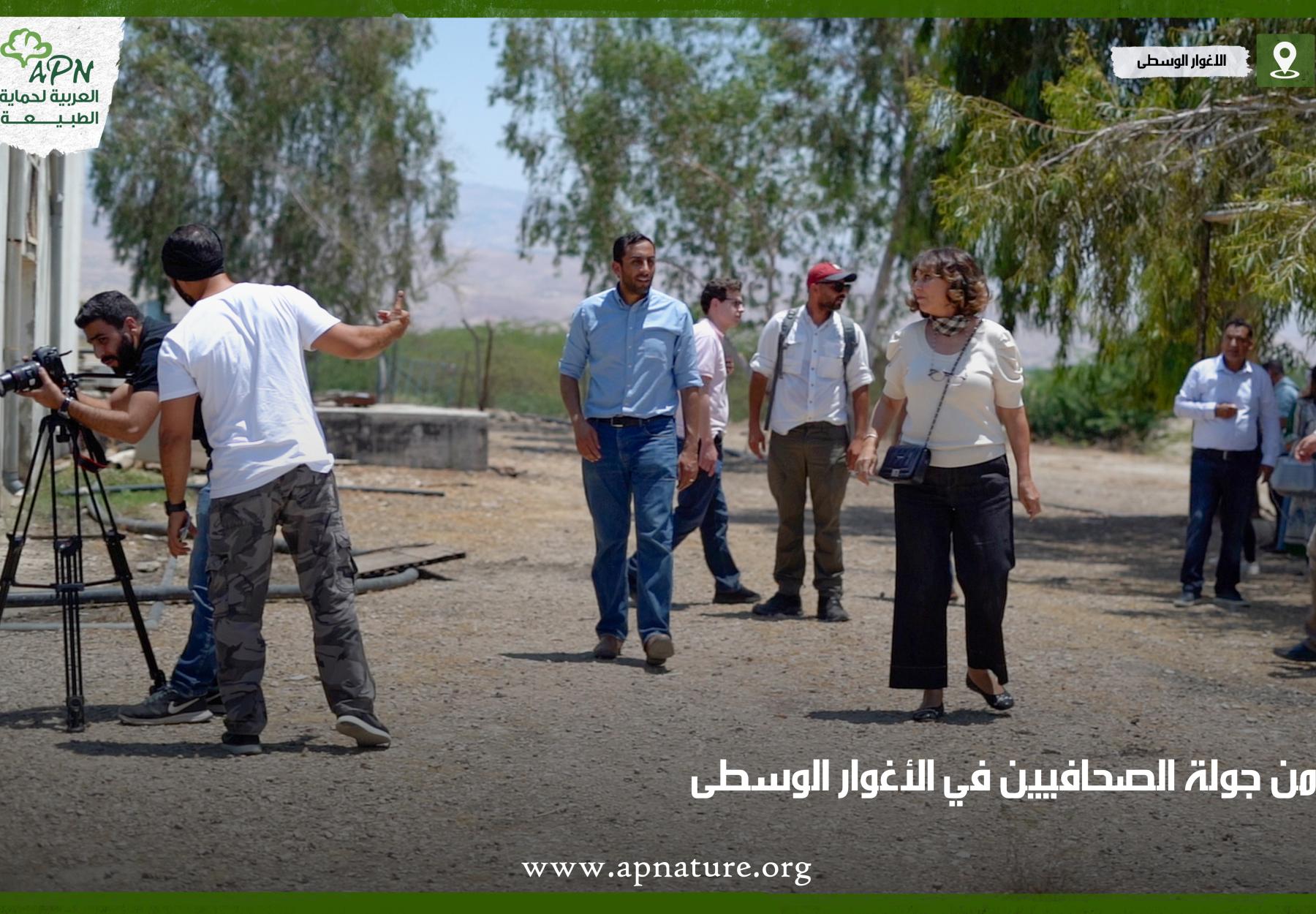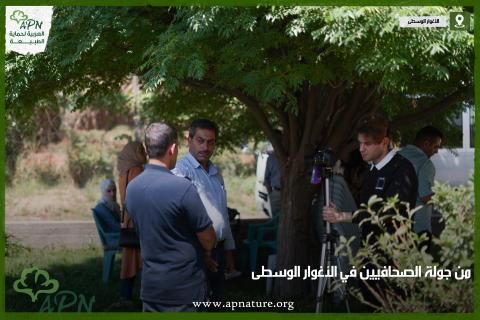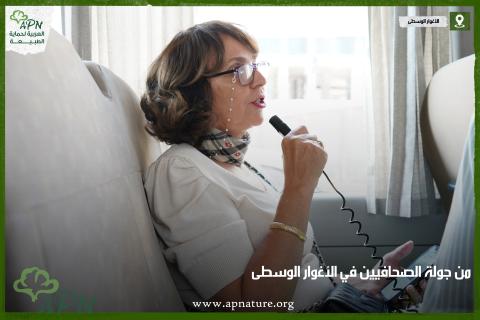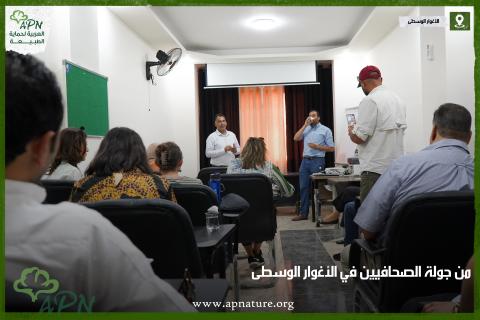
APN | Jordan Valley
23 June 2022
APN organized a field tour for journalists and media professionals to the Central Jordan Valley on the occasion of the World Day to Combat Desertification and Drought. The association hosted a water and environmental expert, Dr. Muna Hindiyeh to enrich the tour, which was attended by local and international media staff, in addition to representatives of newspapers and websites.
Prior to the tour, the General Manager of APN, Mariam Al-Jaajaa, welcomed the attendees and stressed the importance of carrying out such tours to shed light on the issue of desertification in Jordan, and its connection to the fundamental problems that threaten the agricultural sector, especially in the Jordan food basket: the Jordan Valley. She also indicated that the essence of this tour sheds light on the accumulated problems that plague the Jordanian agricultural sector and led to the farmers' reluctance to cultivate their lands and thus turning them into waste over the years. This inflicts great losses on the food basket, as the farmer is the first line of defense for Jordanian food security.
Al-Jaajaa indicated that APN will continue to support the agricultural sector and emphasize the importance of the concept of food sovereignty by influencing regional and international forums on the problems our farmers are facing, as well as by contributing to offering solutions and working through the association's programs "Green Caravan" in Jordan, the Million Tree Campaign in Palestine, and the program raising awareness for schools and universities, "If Only You Knew”.
Through working for two decades with small farmers, Al-Jaajaa explained that one of the most important problems they face is the problem of marketing. She called on the Ministry of Agriculture to develop a clear and publicized participatory plan for marketing the local product that puts the sustainability of small farmers as the priority and asked that the introduction of imported products at the peak of local production not to be allowed.
Al-Jaajaa also asked the Ministry of Agriculture to not cancel the fee for imported goods, which serves a small group of importers and impoverishes hundreds of thousands of agricultural families who are getting poorer year after year, in addition to depriving the state treasury of hundreds of millions annually.
She stressed the importance of setting a minimum price for selling agricultural products such as tomatoes, cucumbers, eggplant and other products so that they are not sold at a price lower than the production cost, which would reduce the size of the farmers' losses. On the other hand she called on government to invest in agricultural industries which would expand the markets for the farmers. She also alluded to the increase in the prices of production inputs, where the price of some of them rose by 400% and stressed the need to set price ceilings for these products so that they are not left in the hands of merchants only.
Al-Jaajaa also summarized the recommendations and vision of APN in finding solutions to the water problem related to desertification, necessitating developing management and efficiency of water use, developing water harvesting projects at national and domestic levels, using water-saving irrigation systems, and encouraging and developing rain-fed agriculture.
She emphasized that planting plant varieties that tolerate heat and drought, and encouraging research that produces these varieties is a prerequisite for resolving the water scarcity problem. She also pointed out that recovering our usurped water rights in the north and south guarantees us a greater share of our right to water. She added that the equitable distribution of drinking water, preserving the soil from erosion, and encouraging afforestation activities appropriate to our environment and climate are issues that must be worked on in parallel with a plan between the public and private sectors to maintain damaged water networks, which drain 40% of the water.
Al-Jaajaa emphasized that giving incentives to farmers to follow the sound principles of sustainable agriculture is an important condition for the advancement of the agricultural sector. It is also essential to develop a law for the use of agricultural land and monitor its implementation. She stressed the importance of partnership between the government and private sectors and civil society in analyzing problems and challenges and coming up with appropriate solutions.
During the tour, a rich discussion took place about the environmental problems that pose a challenge to small farmers, especially in light of the problem of water scarcity and the increasing costs of production inputs.
Dr. Muna Hindiyeh explained that the climate problem is not isolated, as this is a global problem, and many regions of the region have succeeded in finding solutions. She added that we need a scientific management of the water sector to harness as much as possible every drop of water, especially the treated water in water purification and refining plants. The statements of Dr. Hindiyeh camw While passing through the "Tal Al-Mantah" purification plant, where the waste water is refined and then never used in the process of irrigating trees. Dr. Hindiyeh suggested that there be trees designated for fodder or forest trees that can be harnessed.
.
The journalists and media professionals who attended the tour met with a group of farmers in Deir Alla and listened to their problems, which centered on the dilemma of marketing their products, especially in light of the competition of imported products, which match the local ones in their low prices. Other problems include the scarcity of water and the fragmentation of agricultural ownership among several people as a result of inheriting the land due to the regional crises that closed export markets, which affected the process of exporting abroad in light of the high costs of transportation. The farmers affirmed their adherence to agricultural activity, from which they have no plan to withdraw, and which they inherited, unlike the major farmers.
The tour also included lands belonging to small farmers who benefited from the support of APN, which sought to provide them with production inputs, whether in terms of fruit trees or irrigation networks.
It is noteworthy that the Green Caravan program, in cooperation with small farmers and local communities in various regions in Jordan, succeeded in planting 151,534 fruitful trees, on an area of 3,697.5 dunums, benefiting 9,057 farmers, supporting 46,391 individuals. This was done through 338 agricultural activities, with the energy and efforts of 8,317 volunteers.


